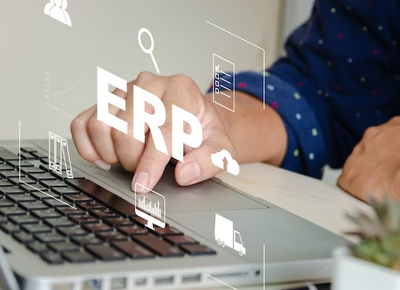ERP Software Solutions Blog

The Ultimate Guide to Choosing the Right ERP Software
Admin
May 11, 2023
What is ERP software?
Importance of ERP software
Software for enterprise resource planning (ERP) is a crucial tool for companies of all sizes and in all sectors. Accounting, finance, accounting, purchasing, manufacturing, inventory management, customer relationship management (CRM), and human resources (HR) management are just a few of the many business processes that ERP Software Solutions is intended to combine and automate. The value of ERP software is found in its capacity to offer organizations a single, integrated system that may help them increase productivity, cut costs, and make better decisions.
ERP software may streamline operations for firms, which is one of its main advantages. ERP software replaces the need for different, standalone software programs by merging numerous company functions into a single system. As a result, corporate processes may become more rapid and effective and data duplication and correctness may be reduced. Furthermore, ERP software may also assist firms in automating a variety of repetitive operations, freeing up time and resources for more strategic endeavors.
The capacity of ERP software to offer real-time data and insights into corporate operations is another significant advantage. Businesses may access current data on anything from sales and inventory levels to financial performance and consumer behavior with ERP software. This can assist companies in making smarter, data-driven decisions and acting swiftly in the face of shifting market dynamics and client demands.
Additionally, ERP software can assist firms increase customer loyalty and satisfaction. Businesses may track client interactions, preferences, and feedback with the use of CRM capabilities built into the system. They can then utilize this data to improve customer care, personalize marketing, and focus sales efforts.
Along with these advantages, ERP software may help organizations cut costs by removing inefficiencies and duplications, minimizing the need for manual data entry and processing, and improving inventory levels and manufacturing procedures. As a result, organizations may be better able to boost profits, improve cash flow, and make investments in expansion prospects.
In general, ERP software is a crucial tool for companies wanting to increase productivity, cut expenses, and make wiser decisions. ERP software can help organizations stay competitive and expand in a market that is always changing by offering a single, integrated system that unifies essential company operations and gives real-time data and insights.
ERP software's key features
Financial Management
Inventory Management
Supply Chain Management
Human Resource Management
Customer Relationship Management
Project Management
Business Intelligence
Mobile Access
Integration
Benefits of implementing an ERP software
How to Avoid 5 ERP Implementation Mistakes
- Insufficient planning: One of the most typical ERP deployment problems is a lack of sufficient planning. Before beginning the implementation process, a well-defined plan outlining the project's goals, timetables, budget, and stakeholders is required.
- Poor data quality:Incorrect or missing data can stymie the implementation process, resulting in errors and delays in system use.
- Not involving end-users:Involving end users in the implementation process can lead to resistance to change, limited user adoption, and a lack of support for the new system.
- Over-customization:Over-customization of an ERP system can result in longer installation times, more costs, and more maintenance.
- Inadequate testing:Inadequate testing can result in system failures, data loss, and errors in system operation.
Business ERP software: How to choose the right one
Identify your business requirements:
Determine your business requirements before selecting ERP software solutions. Determine the features you require, as well as the number of users and the budget.
Research ERP solutions:
Consider customization:
Consider the capacity to tailor the ERP software solutions to your specific business requirements. Some solutions allow for extensive customization, while others do not.